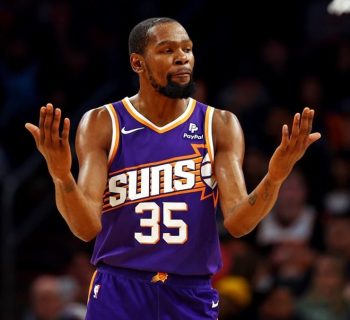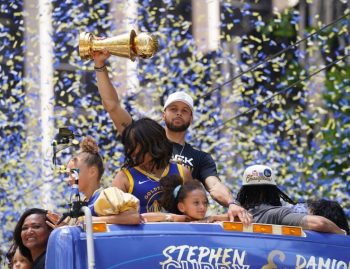NBA
Now What? – Washington Wizards

After losing to the Philadelphia 76ers in five games in the first round of the playoffs, the Washington Wizards have to get creative to evolve into a more balanced team better equipped to compete in the postseason.
Washington’s offensive attack is potent. Led by Bradley Beal, who ranked second in points per game, producing 31.3 per contest, the Wizards generated 116.6 per game, the third-most in the league.
That stems from Washington leading the NBA in pace, averaging 104.67 possessions per contest. Then, there’s the nature of those possessions, which often resulted in Beal or Russell Westbrook scoring in the paint, where the Wizards manufactured 52.8 points per game from, which was the fifth-most league-wide. Those drives often lead to free throws as well. Washington took 26.2 free throws per contest, converting 20.1 of them, both of which led the NBA.
But as lethal as the Wizards’ offense was this season, moving forward, they should grow into a unit that does more damage from beyond the arc. They averaged 29 three-point attempts per game, marginally better than the league-low launched by the San Antonio Spurs (28.4). Thus, it’s not surprising they ranked 28th in threes made per game (10.2), a few ticks better than the 9.9 produced by the Spurs, who again found themselves at the bottom of a long-range category.
As a result of Washington’s struggles from three-point range, they ranked 20th in effective field goal percentage (53.1 percent) and 18th in true shooting percentage (56.9 percent). That’s where the Wizards felt the impact of Thomas Bryant’s absence. He isn’t a high-volume shooter, but in 2019-20, he took two threes per game and knocked down 40.7 percent of them. In the 10 games he played this season before tearing his ACL, he made 42.9 of his 2.1 long-range attempts. Bryant will be nine months removed from his injury when training camp starts, so he may not be ready for the beginning of the 2021-22 campaign.
Either way, Robin Lopez and Alex Len are free agents this offseason, meaning Washington needs to re-sign at least one of them or acquire another center. However, unlike the Wizards’ search for help on the wings, adding a center who spaces the floor like Bryant isn’t a prerequisite.
One way Washington overcomes its lack of long-range scoring is by forcing and capitalizing on turnovers. The Wizards rank 10th in opponent turnovers per game (14.7), which led to an average of 18 points per contest, the eighth-most in the league.
An area they couldn’t compensate for this season was their defensive shortcomings. Washington gave up the most points per game (118.5), and Opponents made an average of 43.1 field goals per contest, placing the Wizards 28th in that category. They ranked 20th in defensive rating, yielding 112.3 points per 100 possessions. As a result, they had a -1.6 net rating, which was 22nd in the league.
Despite the Wizards’ ability to generate turnovers, it failed to mask the reality that they provide little resistance defensively. Opponents produced 13.7 second-chance points per game against them, the seventh-most in the league. The Wizards ranked 18th in points allowed in the paint, surrendering 48.2 per game. And their efforts to create turnovers tended to result in them racking up fouls and sending their opposition to the free-throw line. Teams took 25.4 foul shots per contest against Washington, which ranked a tick below the league-high opponents averaged against the Golden State Warriors (25.4).
Speaking of turnovers, the Wizards coughed up the ball an average of 14.4 times per game, which ranked 20th and led to opponents scoring 17.6 points off those mistakes, the fourth-most in the NBA this season.
Those defensive struggles and the Wizards’ imbalance are why they can’t simply run it back next season, relying on internal improvement to turn them into a more formidable playoff opponent than the one that recently got bounced after five games in the first round.
“This is not a run-it-back team,” Wizards’ general manager Tommy Sheppard acknowledged following the conclusion of their season. “We have to get better. So, to do that, you have to run it better. You have to build. You have to improve. And we’re going to do everything possible, look at every option that we can to make that happen.”
However, that won’t be easy. Washington will enter free agency over the cap. The Wizards will have the mid-level and biannual exceptions to help them fortify their roster. The former could be the key to them adding a stout perimeter defender, ideally, one who fits the description of a three-and-D wing. The latter of those exceptions might be how Washington acquires a center to pair with Bryant and Daniel Gafford.
As for the draft, the Wizards have the 15th pick in the first round, which isn’t ideal, but it’s the price for making the playoffs. Still, at the 2015 draft, they acquired Kelly Oubre Jr., who was the 15th selection that year. Opting to take the best player available is a strategy that should never get knocked, but with Washington prioritizing the present, gravitating towards an NBA-ready wing or at least the prospect they consider the best remaining at that position would align with what’s taking precedence.
The Wizards also have to decide whether to bring back head coach Scott Brooks, who is no longer under contract. During Sheppard’s exit interview, he said Brooks “did a hell of a job keeping this team together through some of the most difficult, dark moments probably in franchise history.” In January, the Wizards dealt with a COVID-19 outbreak that suspended their season for two weeks.
Westbrook strongly expressed support for bringing Brooks back, which isn’t surprising, considering how well the two of them get along, dating back to their time together with the Oklahoma City Thunder.
“Me personally, I don’t see why Scottie should go anywhere. And not just because we’re close, but he’s done a hell of a job with our team, our program since I’ve been here. …“He’s still the same coach Brooks, and he brings intensity. He brings the effort like he was playing, but he’s a coach. That’s something you can’t teach. That’s something you can’t have. So, if it was up to me, I don’t think he should go anywhere.”
Lastly, there’s the threat Beal asks out this summer; don’t mistake that for a prediction, but he has one year left on his contract plus a player option worth $37.3 million for the 2022-23 season. As loyal as he is, and as enjoyable a season as it was for the Wizards, they got easily dispatched by the Sixers in the first round of the playoffs, and their path to improvement is difficult, especially when it comes to vaulting themselves into title contention. Perhaps Beal, a three-time All-Star, decides it’s in his best interest to join a team better-suited to compete for the Larry O’Brien trophy next season, especially after adding him to its roster. Making that decision now would also allow Washington to get a package of players and picks in return for obliging with his request, rather than risking losing him for nothing next offseason.
Beal loves where he is, and his first choice is to win with the Wizards. But like Shepard said: “this is not a run-it-back team;” they have to improve the roster to help convince Beal there’s no need for him to take his talents elsewhere.













